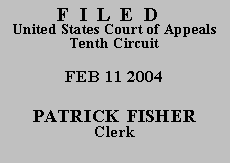 UNITED STATES COURT OF APPEALS
UNITED STATES COURT OF APPEALS
 UNITED STATES COURT OF APPEALS
UNITED STATES COURT OF APPEALS
| CHARLOTTE KEMPF,
Plaintiff - Appellant, v. CITY OF COLORADO SPRINGS, principal KOFI ANNAN, and agent JOSHUA KEMPF. Defendants - Appellees. |
|
Charlotte Kempf and her mother ("the Kempfs") live on property in Colorado Springs, Colorado. Charlotte Kempf's late father, Starr Kempf, constructed an outdoor sculpture garden on the property that included wind sculptures standing more than fifty feet high. The City of Colorado Springs ("the City") filed multiple zoning enforcement actions against the Kempfs. Pursuant to one such action, the state court ordered the Kempfs to remove eight of the taller sculptures from their property within ninety days. Charlotte Kempf claims to have timely appealed the order, but before the appeal could be heard on the merits, she asserts that Starr Kempf's grandson, Joshua Kempf, removed some of the sculptures himself.
Charlotte Kempf then initiated this action, which she labels a counterclaim and libel of review in admiralty, and which she describes as regarding false claims in the original estate. Kempf alleged that the City and Joshua Kempf made false claims against the estate, and that the claims led to the injunction to remove the sculptures and the state court judgments against her. She also argues that the City and Joshua Kempf are agents of Secretary General of the United Nations Kofi Annan, and that Joshua Kempf is an agent of former Secretary of the Treasury Paul O'Neill. She included Annan and O'Neill as defendants in her original complaint on an agency theory. The district court dismissed the case for failure to state a claim, and to the extent that Kempf sought review of state court judgments, for lack of subject matter jurisdiction. Kempf appeals.
Because Kempf is pro se, we construe her complaint liberally. See Hall v. Bellmon, 935 F.2d 1106, 1110 (10th Cir. 1991). If we can reasonably read the complaint "to state a valid claim on which the plaintiff could prevail, [the Court] should do so despite the plaintiff's failure to cite proper legal authority, her confusion of various legal theories . . . or her unfamiliarity with pleading requirements." Id. However, it is not our role to be an advocate for a pro se litigant. Id. We review a dismissal under Fed. R. Civ. P. 12(b)(6) de novo. Dubbs v. Head Start, Inc., 336 F.3d 1194, 1201 (10th Cir. 2003). Thus, we accept as true well-pleaded factual allegations and resolve all reasonable inferences in the plaintiff's favor. Id.
Even construing Kempf's complaint liberally and drawing all reasonable inferences in her favor, we are unable to discern a claim upon which relief may be granted. We agree with the district court's finding that while the factual allegations are fairly clear, the claims Kempf asserts on the basis of those allegations are not legally cognizable. Moreover, Kempf apparently seeks review of the state court decisions in the zoning enforcement actions. To the extent that she does so, we lack subject matter jurisdiction. "[A] party losing in state court is barred from seeking what in substance would be appellate review of the state judgment in a United States district court, based on the losing party's claim that
the state judgment itself violates the loser's federal rights." Johnson v. De Grandy, 512 U.S. 997, 100506 (1994). Thus, we conclude that the district court properly dismissed all of Kempf's claims against all defendants.
We also agree that the district court's decision to award costs to defendants was proper.
Accordingly, we AFFIRM.
ENTERED FOR THE COURT
Carlos F. Lucero
Circuit Judge
*. The case is unanimously ordered submitted without oral argument pursuant to Fed. R. App. P. 34(a)(2) and 10th Cir. R. 34.1(G). This order and judgment is not binding precedent, except under the doctrines of law of the case, res judicata, and collateral estoppel. The court generally disfavors the citation of orders and judgments; nevertheless, an order and judgment may be cited under the terms and conditions of 10th Cir. R. 36.3.